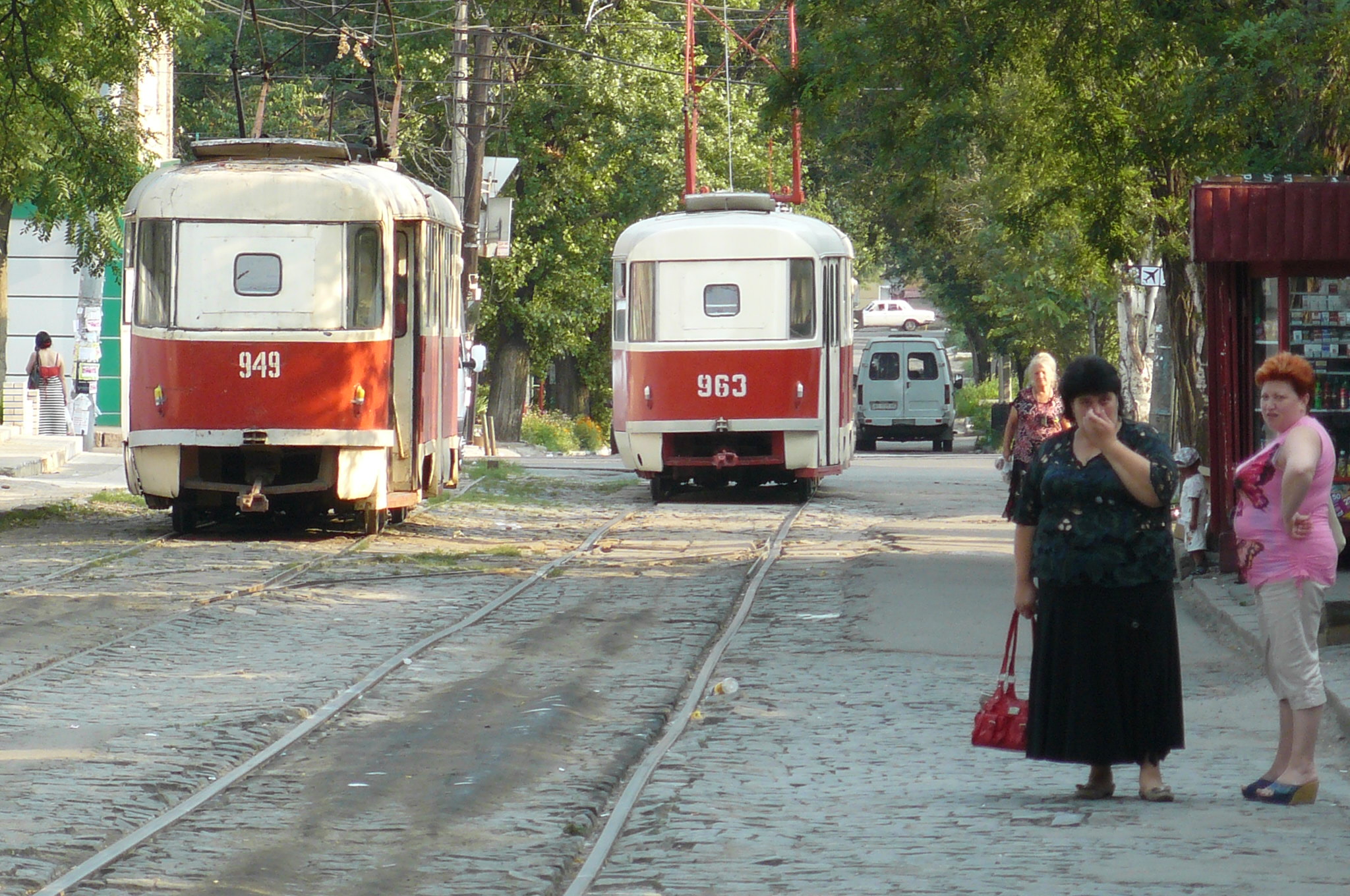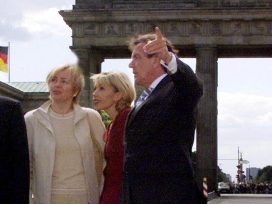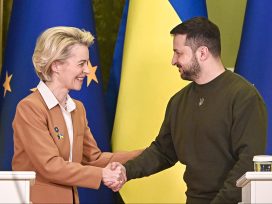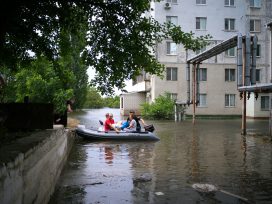Western Ukrainian intellectuals’ tendency to blame the Donbas for the war is based on a longstanding orientalization of the ‘Soviet’ Other. Reminiscences about erstwhile cultural diversity sit awkwardly alongside hostility to the East.
The Maidan protests in 2013–2014, Russia’s annexation of Crimea and the war in parts of the regions of Luhansk and Donetsk have become the litmus test for ideological preferences in Ukraine. Reactions to these events and the language used to describe them is seen as a marker of political affiliation. Emotional and ideological tensions have also been evident in academic publications: Ukrainian writers often select facts to suit their conclusions, sources of information are regularly quoted without verification, pronouncements on social media are not contextualized or questioned, descriptions of the dynamic socio-political situation are often static and rest on essentialized categories of ‘identity’, and serious transnational and transregional comparisons are still a rarity.
The Maidan protests, together with the changes to national borders and the war that ensued, have revived many old stereotypes, including the images of ‘our people’ and the ‘Other’. The following analysis is centred on intellectual discourse rather than on public opinion or, for instance, attitudes towards ‘temporarily displaced persons’ (the bureaucratic term for residents of the Donetsk and Luhansk regions who have relocated to other parts of Ukraine). The purpose is not to systematically study whether one stereotype or other matches social reality but to contextualize statements by intellectuals. I do not address the history of the war or the sociological or anthropological aspects of ‘the Donbas identity’; nor do I discuss the dynamics of Ukraine’s national and linguistic self-identification post-Maidan.

Trams in Donetsk. Source: Wikimedia
L’viv–Donetsk: The two poles of Ukraine
The binary opposition ‘L’viv-Donetsk’, referring to two supposedly opposite poles of politics and culture, took hold in Ukrainian intellectual debates during the 1990s. In this pairing, L’viv usually represented ‘Europeanness’ and ‘Ukrainianness’ and Donetsk ‘Sovietness’ and ‘pro-Russian sentiment’. This simplified antinomy was reinforced by the fact that post-Soviet L’viv was primarily a Ukrainian-speaking city, while post-Soviet Donetsk was primarily Russian-speaking. Voters’ preferences became an additional (and by the 2000s – dominant) argument for the cities’ ‘distinctiveness’. For instance, in the second round of the presidential race in 2010, the ‘Donetsk’ contender Viktor Yanukovych got 8.6 per cent of votes in the L’viv region while in the Donetsk region the figure was over 90 per cent.
The first time that L’viv and Donetsk found themselves part of the same country was in 1939, as the result of Germany’s and the Soviet Union’s joint aggression against Poland, the act that signalled the start of World War II. Before the provisions of the Molotov-Ribbentrop Pact were put into practice, L’viv (and, more broadly, eastern Galicia) was a part of Poland (1918–1939). Previously it had belonged to the Austrian Empire (1772–1918) and the Kingdom of Poland (1387–1772). Until the end of the eighteenth century, the territory of present-day, south-eastern Ukraine was a ‘wild steppe’ – a place where nomadic and settled civilizations met, the border region between the Polish-Lithuanian Commonwealth and the Ottoman and Russian Empires. In the second half of the nineteenth century, after it became a part of the Russian Empire, its coal and steel industry began to develop. At that time, most of the territories now referred to as ‘Donbas’, including settlements such as Yuzovka (today Donetsk), Luhansk and Mariupol, were a part of the huge Yekaterinoslav governorate. The Donetsk and Luhansk regions, as defined by their present-day administrative boundaries, are a product of the Soviet policies of the 1920s and 1930s. Meanwhile, one part of the Donetsk coal basin (deriving its name from the Donets River), the so-called ‘western Donbas’ with its centre in Pavlograd, remained part of the Dnipropetrovsk region (Yekaterinoslav was renamed Dnipropetrovsk in 1926, in honour of the Bolshevik Grigory Petrovsky). Beginning in the nineteenth century and continuing throughout the twentieth, the Donetsk coal basin attracted migrants of different ethnic and religious affiliations. In addition to Russians and Ukrainians, new settlers included Bulgarians, Jews, Tatars and Greeks, and the dominant Orthodox Church existed side by side with Jewish, Old Believer, Protestant and Muslim communities.
In the nineteenth century, the idea of sobornist’ – the cultural and political unity of the ‘Ukrainian lands’ – united most supporters of the Ukrainian national movement in both the Russian and Austro-Hungarian Empires. The main criterion of the ‘Ukrainianess’ of the lands that were to form a future Ukraine (as an autonomous region or independent state) was a command of the Ukrainian language among peasants in a given area. Meanwhile, in both the Austro-Hungarian and Russian Empires, cities were mostly non-Ukrainian speaking – although Habsburg language policies were much more tolerant towards the Ukrainian language than the restrictive policies pursued in the Romanov empire. Soviet nationality policies strengthened the presence of the Ukrainian language in Kharkiv, Kyiv, Odessa and Stalino (as Donetsk was called from 1924–1961), but did not enhance the language’s status in the cities of eastern Ukraine. The Sovietization of L’viv included its ‘Ukrainization’, although within a very rigid Soviet ideological framework.
The Soviet Union split up in 1991 along the borders of its fifteen constituent republics. In the Donetsk and Luhansk Regions (as well as in Pavlograd – the Dnipropetrovsk region), miners organized massive strikes in the summer of 1989 (strikes also took place in Russia, in the Kuznetsk coal basin, or Kuzbass). Their initial economic demands quickly extended into the realm of politics. By spring 1991, before the August coup in Moscow and the Ukrainian independence referendum in December, the miners were demanding Gorbachev’s resignation and the transfer of the ownership of the mines from Moscow to Kyiv. Within the first few years of Ukraine’s independence, however, Kyiv clearly demonstrated its ineptitude at handling the region’s complex socio-economic problems and at modernizing the coal industry. Post-Soviet privatization and gang warfare created a small ruling class in Donetsk and Luhansk – Ukraine’s most urbanized and industrialized areas – that controlled the region’s industry, shaped its political preferences and sought to take advantage of anti-Kyiv stereotypes and ideas about the special role of ‘Donbas, which feeds all Ukraine’.
Where does ‘eastern Ukraine’ end?
In the geography of post-Soviet Ukraine, it is impossible to demarcate clearly between Ukrainian-speaking and Russophone areas, or between the Ukrainian Greek Catholic Church and Orthodoxy (the latter has three different churches in Ukraine, plus communities of Old Believers). And yet, intellectuals have contributed a great deal to the popularization of the image of ‘two Ukraines’ divided by language (Russian versus Ukrainian) and history (‘Europe’, which is to say Poland and Austria, versus Russia and the USSR). The ‘two Ukraines’, postmodern irony notwithstanding, figure in these texts as geographically demarcated and internally homogenous communities (which were often associated with specific electoral preferences). Moreover, one of the Ukraines (‘eastern Ukraine’) was described not only as different but also as worse, ‘less European’ and ‘more Sovietized’.
In the late 1980s and early 1990s, many in Ukrainian intellectual circles believed it was necessary to ‘de-Russify’ Ukraine and expose the lies of Soviet propaganda – this would open the eyes and ‘purify’ the minds of the people of eastern Ukraine, who had been ‘corrupted’ by external influences. By the mid-1990s, however, it became obvious that the Russian language not only continued to be widely used, but also that it predominated in various spheres of Ukrainian public life, while political power continued to rest in the hands of the members of the same post-communist elite (many of them natives of the country’s industrialized eastern regions).
In the reasoning of a number of influential writers and commentators, ‘the East’ was to blame for the failure of ‘the Ukrainian dream’. The borders of this ‘East’ changed, depending on the political situation. At the end of the 1990s, the novelist Yurii Andrukhovych, from Ivano-Frankivs’k, wrote that Kyiv ‘belonged to the zone of influence of certain ‘non-Ukrainian’ mental and psychological currents’.1 After the Orange Revolution in 2004, when Kyiv showed its ‘pro-Ukrainian and pro-European face’, he said his attitude towards Ukraine’s capital had changed.
For Andrukhovych, ‘western Ukraine’ was ‘the last territory’ where, thanks to the Habsburg Empire, the Ukrainian language and European architecture had survived.2 In a book published nearly twenty years later, The Lexicon of Intimate Cities (2012), Andrukhovych admitted that he had been wrong on that point too: ‘I should have fallen to my knees and begged the people of Dnipropetrovsk to pardon me for my thoughtless nonsense.’3 After the Maidan in 2013–2014 and the beginning of an armed conflict in the Donetsk and Luhansk regions, Andrukhovych wrote that Dnipropetrovsk had become the border ‘between Ukraine and non-Ukraine’.4 In other words, by 2014 one could think that ‘eastern Ukraine’ was limited to the war-torn ‘Donbas’.
Ukraine minus Donbas = Europe?
The Maidan protests mobilized Ukrainian society. Yanukovych’s attempts to stage an ‘anti-Maidan’ in Kyiv by bringing organized groups of people from Ukraine’s eastern and southern regions to the capital prompted anger among the supporters of the ‘Revolution of Dignity’ and raised fears of a violent escalation (it is important to remember that until the end of 2013 the protests were peaceful). The emotional intensity of the moment was reflected in a ‘Christmas column’ by the L’viv-based historian Yaroslav Hrytsak, published at the end of 2013. The text was a satirical description of ‘the Soviet-minded people’ – people who were attached to Soviet TV shows, Russian salads (especially the so-called Olivier salad), horoscopes and, most importantly, never learned to sing carols, always believing only in things ‘that were useful’.5 Writing at a moment when Ukraine was in turmoil, Hrytsak offered an emotional explanation of the role of culture and ‘values’ in the country’s political development (key themes in Hrytsak’s social commentary).6 Hrytsak’s Christmas column was especially telling because he had been criticizing the discriminatory policies of ‘two Ukraines’ for many years.7
In April 2014, when Ukraine was gradually losing its legitimate monopoly on violence in Luhansk and Donetsk, writer and Ivano-Frankivs’k native Taras Prohas’ko made the following statement:
The people living in our remote eastern regions are very different people. The kind of people whom we zakhidnyaki (westerners) cannot understand, accept or, least of all, consider one of us. The sweet fairy tales about sobornist‘ (cultural and political unity) fall apart instantly when you meet these people in person. They have their own agenda. And they are not at all like us.8
In May 2014, when the Anti-Terrorist Operation launched by the government in Kyiv was already underway, the L’viv journalist Ostap Drozdov used his Facebook page to comment on the first killings of Ukrainian soldiers:
I have a feeling that other than Galicians nobody is dying for the Donbas. I have already said more than once that Donbas as a part of Ukraine is not worth a single death. Least of all a Galician’s death… Skhidnyaki (people living in the east of Ukraine) should be on the front lines of the battle for eastern Ukraine.9
In June 2014, amidst the political discussions about the necessity of building a defensive wall on the Russian border, another L’viv journalist, Volodymyr Pavliv, posted on Facebook:
building a wall along the border is a good idea, but hardly a feasible one – there are moskali (a pejorative definition of the Russians – A.P.) on either side of the wall, so maybe we should waste no time and build the wall right at the Zbruch River (the river that separated the Russian and Austro-Hungarian Empires) so that we would not have to relocate it again later?10
Most of these public statements were made by Ukrainian intellectuals from eastern Galicia. They might be called ‘Galician reductionism’ – the idea that Ukraine can prosper only if it gets rid of the dead weight of the ‘incurably Sovietized Donbas’. The term is not intended to imply that all people living in a given western Ukrainian region share the view that Ukraine should let some of its territories go. It simply points the fact that most commentators supporting this solution to the ‘Donbas problem’ live in Galicia. This is important because the very same writers are known for their nostalgic pronouncements about ‘lost multiculturalism’ and ‘the golden age of the Habsburgs’. In other words, pretty phrases about erstwhile diversity have not reduced negative attitudes towards real diversity in the slightest, which was always perceived not as a cultural advantage but as a political threat.
The slogan ‘Let’s get rid of Donbas’ was not invented in 2014. It seems more appropriate to talk about a new lease on life for ideas that emerged as early as 2010, when Viktor Yanukovych was elected president of Ukraine. Many believed then that it was Crimean and Donbas voters that brought Ukraine under the thumb of a corrupt and poorly educated former criminal.11 Shortly after Yanukovych came to power, the L’viv-based writer Yuriy Vynnychuk published a column in which he asked ‘Why do we need such a big state?’ He went on to claim that he would ‘let go of Crimea and Donbas’, confident that after this ‘we are going to have an entirely democratic state’.12 In the summer of 2010, Yurii Andrukhovych also advocated ‘giving Crimea and Donbas the opportunity to secede’. The population of these regions, who voted for Yanukovych en masse, was ‘politically a part of the Russian nation’, he wrote. As for the Ukrainian minority, ‘it would be easier to offer them the opportunity to emigrate’.13
Arguing for abandoning ‘unnecessary’ territories, rather than acquiring new ones, is fairly unusual in the history of nationalism. The logic can be described as frustration with the ‘incorrect’ political behaviour of ‘the people of the Donbas’, who are viewed as a collective. The offer of a ‘civilized divorce from Crimea and the Donbas’ was formulated as an abstract (and bloodless) realization of ‘the right to self-determination’, which was intended, first of all, to rescue the remaining (and not so hopeless) part of Ukraine. And in the context of the war in 2014, deliberately or not, this puts the blame for the violence in regions of Donetsk and Luhansk on the local population rather than on the Russian invasion, mistakes by the Kyiv government, and the ‘neutrality’ of local elites. In this narrative, it was precisely the local population who if they did not invite, then ‘failed to drive out the occupiers’, and which is therefore fully responsible for the war and its consequences.
Intellectual descriptions of the loss of part of the Donbas rarely allude to a sense of pain. If anything, Ukrainian intellectuals have often betrayed relief that the country has got rid (at least partially) of an ‘unnecessary’ and ‘un-Ukrainian’ region. In September 2014, Yurii Andrukhovych said emphatically that:
The only thing I know is that, even without Donbas, our goal – a free, humane, European country – can be reached only with great difficulty, and that if Donbas stays with us, this goal becomes simply unreachable – just forget it.14
In November 2014, Ostap Drozdov shared his ‘political arithmetic’:
Ukraine + Donbas = Donbas
Ukraine – Galicia = Donbas
Ukraine + Galicia = Europe
Ukraine – Donbas = Ukraine
Galicia + Donbas = war15
In early 2015, the essayist who came up with the metaphor of ‘two Ukraines’, Mykola Riabchuk, confided that: ‘I’ll be honest – I like the new Ukraine, without Donbas and Crimea, much more… In principle, I’m not against Donbas being in Ukraine, but only provided that its people earn this right sometime in the future.’16 In late 2014, the L’viv philosopher Taras Voznyak argued that ‘the Soviet society of the Donbas’ had ‘fallen out of the process of creating a new political community – the Ukrainian civic nation’ and ‘fallen into extreme Russian nationalism with elements of fascism’.17 This line of thinking was carried to its most extreme by Olexander Boichenko, an essayist from Chernivtsi, who wrote arrogantly about ‘the residents of the Donbas’ as ‘oligophrenic people with no future’.18 Boichenko, adopting a Darwinist vocabulary, argued that ‘the human subspecies Homo Sovieticus who live in Donbas’ simply ‘should disappear’ if they are incapable of accepting the future and continue to cling desperately to the Soviet past.19
All these pronouncements made by reputedly ‘liberal’ and ‘European’ writers conjure up a bleak image of a homogenous ‘Soviet Donbas’ that is static and utterly useless for the Ukrainian and European projects. According to this logic, the Donbas in Ukraine is an alien, aggressively hostile and anti-cultural element, which only weakens Ukraine and pulls it back into the ‘Soviet past’.
On behalf of ‘Donbas’
An important feature of Ukrainian intellectual discussions of the 1990s–2000s was the weakness (or even absence) of attempts to conceptualize the position of ‘eastern Ukraine’. The subject of ‘two Ukraines’ was addressed either from a Galician or from a Kyivan perspective. The ‘other side’, so to say, appeared uncommunicative and unwilling to talk. The result was a weak interest in ‘the East’ on the part of intellectuals – a point raised by one of the most influential Ukrainian social commentators, Ivan Dziuba. A former dissident and a native of the Donetsk Region, Dziuba wrote that ‘so-called national-democratic forces were partially to blame’.20
Perhaps the sole exception to the general rule was the Ukrainian-language writer Serhii Zhadan, who was born in the region of Luhansk and lives in Kharkiv. Zhadan’s poetry and prose (much of which is devoted to the Donbas) has gained wide recognition both in Ukraine and abroad. During the war, Zhadan wrote several commentaries in which he urged against blaming the population of the war-torn region for the results of Russian aggression or decisions made by Kyiv and local elites. For example, Zhadan wrote:
So, it turns out that our virtue only extends to those who are in a majority. It does not apply to those who have found themselves in a minority. For the latter group, we reserve our arrogance and inattention, our anger and our fears.21
Here, Zhadan identifies with the Ukrainian intellectual mainstream, speaking about a ‘we’ who are incapable of understanding those that have found themselves in a minority. Responding to Boichenko, who took Zhadan to task for his humanization of ‘Homo Sovieticus doomed to extinction’, Zhadan wrote sarcastically:
Sometimes I think it is good to have a kind heart and nerves of steel – to watch how Neanderthals are being killed by multiple rocket launchers, all the while talking about evolution, drawing historical parallels and putting forward geopolitical proposals, denying some people the right to continue to exist by your side in this nice, just world.22
Zhadan’s tone is fundamentally different from Boichenko’s: he seeks reconciliation, appeals to humanist values and refuses to engage in historical-cultural discussions and definitions. Perhaps it was this, together with Zhadan’s international recognition, that provoked heated reactions from some of his colleagues. In particular, the L’viv poet Viktor Neborak advised Zhadan, to become the minister of culture of the ‘Donetsk People’s Republic’.23
In the course of the war, the spotlight has been focused on writers, philosophers, historians and sociologists from Donetsk and Luhansk. These are intellectuals who write in Ukrainian and Russian and who were compelled to move to Kyiv, L’viv, Ivano-Frankivs’k or Kryvyi Rih. They include the historian and sociologist Oksana Mikheeva, the journalists Serhii Harmash and Oleksiy Matsuka, the sociologist Ilya Kononov, the poet Lubov Yakymchuk, and the social commentator Kateryna Yakovlenko, and have become ‘the Ukrainian voice of Donbas’.
The historian and Russian-language writer Olena Styazhkina has become one of the most prominent figures in this group. In her writing and talks, she repeatedly criticizes the notion of ‘Donetsk people’ as a special cultural or political group, and asks people not to identify the region’s population with ‘separatists’ and ‘terrorists’. According to Styazhkina, in order to understand the logic of the actions of the majority of the people living in these war-torn areas, it is necessary to recall the experience of occupation – a situation where most people think only about their own survival, and not about ‘guerrilla warfare’ or ‘unqualified support for the regime’.24
The issue of the collective responsibility of the ‘Donbas people’ also haunts other writers who left the region as the war raged. Oleksandr Yeremenko, a philosopher from Luhansk, writes repeatedly in his reflective diary on the events in his native town about ‘Luhansk residents’ penchant for wait-and-see’, and their ‘excessive absorption in daily routines’.25 A resident of the town of Sverdlovsk, near Luhansk, Olena Stepova (Elena Stepnaya), who gained fame with her online posts, also talks about ‘a town of taciturn consent’, where people walk hurriedly along with their minds focused on their own problems and ‘do not feel the coldness of war creeping in’.26
An important recurring theme in the writings of people who stood up for Ukraine’s territorial integrity in Donetsk and Luhansk and participated in local Maidan protests is ‘the feeling of abandonment’, the feeling that local pro-Ukrainian initiatives were supported neither by Kyiv nor by local elites.27 Despite the passivity of the majority of the region’s residents, the fact that Ukraine did not provide assistance to those who fearlessly stood up for the nation in Donetsk and Luhansk becomes an important argument for showing that the war was not predetermined by a ‘Donbas identity’.
Ukraine without Galicia = the Russian World?
In Ukraine one rarely comes across comparisons of the anti-Donbas rhetoric of the champions of ‘a smaller and European Ukraine’ and the anti-Galician rhetoric of the champions of the so-called Russian World. But a parallel reading of both types of text can reveal many interesting things. Petro Tolochko, director of the Institute of Archaeology at Ukraine’s National Academy of Science in Kyiv, who is also known for his anti-Maidan views, wrote an essay arguing that it is necessary ‘to abandon once and for all the chimerical dream of turning Ukraine into a Greater Galicia’ and that Donbas rejects ‘the national socialist values of Galicia’.28 According to Tolochko, in Ukraine ‘the population has never crystallized into a single nation’ and Russians and Ukrainians ‘are essentially one ethnic group’.29 For him, the war in the Donbas is not just a ‘civil’ war – it is a war waged ‘by Ukrainian nationalists of the Catholic faith against a population raised in Russian culture and with a Christian Orthodox identity’.30 This formula essentially identifies Ukrainian nationalism with the communion of the Ukrainian Greek Catholic Church with Catholicism (Tolochko argues that the ‘western Ukrainian sub-ethnic group’ came into being as a result of the Union of Brest in 1596). Tolochko’s concept mirrors the narrative of Ukraine’s ‘Europeanness’ – while Tolochko argues that ‘Europeanness’ is evil rather than good, like his opponents he localizes this phenomenon geographically, describing it using the techniques of homogenization and othering. The only difference is the good thing is now ‘Soviet-ness’, which is identified with the ‘Christian Orthodox faith’.
In Tolochko’s pejorative description of the ‘West’, emphasis is placed on criticism of homosexuality. According to him, this links Ukraine to ‘the West’s withering liberal societies, many of whose value orientations are not only incompatible with common sense but are also obviously contrary to Divine Providence’.31 On this, Tolochko finds himself in complete agreement with the former leader of the Ukrainian nationalist Right Sector, Dmytro Yarosh, whom he unconditionally condemns in his writing. According to Yarosh:
To a large degree, the propaganda of homosexuality and gender ideology is supported by the West … Now let’s stop and think whether Ukraine needs this sort of eurointegration, when someone forces their will upon us? Slavish worship of a colossus with feet of clay – the European Union – will not do us any good.32
The identical attitudes towards homosexuality and the essentialization of the ‘West’ expressed by Tolochko and Yarosh are the area where two seemingly antithetical narratives overlap.
The nationalism of abandonment and the fear of complexity
In post-Soviet Ukrainian intellectual debates, the idea that the country is ‘too big’ and that it is burdened by the Soviet experience, which is disproportionately distributed among its regions, has proved to be very much in vogue (in both times of peace and times of war). In the minds of many intellectuals, the ideal of national homogeneity as the necessary precondition for successful state building and efficient post-communist transformation has become an undisguised yearning for homogeneity. A particular irony is lent to this yearning by the fact that it is expressed by the same writers who owe their literary fame to nostalgic depictions of ‘the lost multiculturalism’ of Austro-Hungary and are reputed to be ‘postmodernists’.
Describing the fear of modern complexities, they often apply a categorical label such as ‘identity’ – a static set of characteristics determined once and for all, unchangeable even through (correctional) education. Attributing a set of essentialized characteristics to the entire population of a certain region (regardless whether it is ‘Donbas’ or ‘Galicia’) can be called an internal orientalization – a strategy for creating the Other (benighted and dangerous at the same time) out of part of the territory and population of one’s own country. Both models of internal orientalization (anti-Donetsk and anti-Galician) rest on identical ideological postulates and intellectual pre-conditions: fear of diversity, failure to recognize that social phenomena can be dynamic and variable, and a rigid notion of ‘norms’ and ‘deviations’.
The Ukrainian debate about the ‘otherness’ of ‘the Donbas’ not only has a local dimension, but also a more general significance, touching as it does on key issues of contemporary politics: How much heterogeneity can a democratic system sustain? What is the relationship between intellectual, media and political discourse? How do the categories of citizenship and ethnicity, political loyalty and religious and linguistic belonging relate in the modern world?
Juri Andruchowytsch, Das letzte Territorium (Frankfurt am Main, 2003), p. 128.
See Andruchovych's essay ‘Erz-herz-perz’ (1994), in which he enumerated the reasons why Ukrainians should be grateful to the Austrian Empire and nostalgically recalled the years when L'viv was a part of the same political entity as Vienna and Ljubljana. In the German language publication of this essay that discriminatory phrase about the three east Ukrainian cities was surprisingly omitted: Jurij Andruchowytsch, Das letzte Territorium, s. 42.
Yuriy Andrukhovych, Leksykon intymnykh mist (Kyiv, 2012), p. 67.
Yuriy Andrukhovych, ‘Synio-zhovtyj industrial’, <http://zbruc.eu/node/32995> (published on 20.02.2015). For more on the specifics of the trajectories of various eastern and southern Ukrainian cities see Andrew Wilson (ed), What Does Ukraine Think? (Brussels, 2015).
Yaroslav Hrytsak, ‘Rizdviane’, <http://gazeta.ua/articles/grycak-jaroslav/_rizdvyane/534035> (published on 27.12.2013). Compare a critical comment from Volodymyr Kulyk, who urged Hrytsak to ‘pay attention to the Soviet elements characteristic to some extent to the majority of our nation, not excluding the Galicians’: Volodymyr Kulyk, ‘Pro koliadky, inshuvannia ta mizhhrupovi vidminnosti’, <http://krytyka.com/ua/community/blogs/pro-kolyadky-inshuvannia-ta-mizhrupovi-vidminnosti> (published on 30.12.2013).
Among Hrytsak's numerous texts with appeals for ‘changing the values Ukrainian society is based on’ see Yaroslav Hrytsak, ‘Ukraina vytrymaje і tse vyprobuvannia’, < http://zbruc.eu/node/19884> (published on 12.03.2014); Ibid., ‘Iak podolaty istoriiu’, <http://www.3republic.org.ua/ua/ideas/13527> (published on 01.06.2014). See also his later interview about the importance of ‘solidarity with Donbas’ and ‘the end of the Donbas identity’: ‘Zaraz nastupaje kinets donbas'koi identychnosti – Yaroslav Hrytsak’, <http://www.radiosvoboda.org/a/27691372.html> (published on 22.09.2016).
The most important text in this regard is Yaroslav Hrytsak, ‘Dvadtsiat' dvi Ukrainy’, in Yaroslav Hrytsak, Strasti za natsionalizmom (Kyiv, 2011), pp. 216–228.
Taras Prokhas'ko, ‘Dalekoskhidnyi ukrains'kyi front’, <http://gk-press.if.ua/node/11885> (published on 23.04.2014).
Drozdov's main thesis does not correspond to the statistics of the loses of Ukrainian army, but it was quite telling as a widespread stereotype in the initial stages of war. See also his article: Ostap Drozdov, ‘Zakhidna Ukraina – na vykhid’, <http://gazeta.dt.ua/internal/zahidna-ukrayina-na-vihid-_.html> (published on 11.04.2014). In that text Drozdov describes the entire Ukrainian society as a ‘victim of the beautiful mythology of sobornist` mythology’ and calls the west of the country ‘the most productive and progressive segment of Ukraine’.
Volodymyr Pavliv's Facebook post, June 13, 2014. Compare his comments on ‘a two-speed Ukraine’: Volodymyr Pavliv, ‘Ukraina dvokh shvydkostei’, <http://zaxid.net/news/showNews.do?ukrayina_dvoh_shvidkostey&objectId=1311587> (published on 15.06.2014).
In the second round of the presidential elections on February 7, 2010 Viktor Yanukovych defeated Yulia Tymoshenko by just 3.48%. In Donetsk region Yanukovych received 90.44% of votes, in Luhansk region – 88.96%, in Crimea – 78.24%. Tymoshenko got just 7.72% in the Luhansk region, in Donetsk – 6.45%, in Crimea – 17.31%. At the same time, in the Ivano-Frankivs`k and Ternopil regions Tymoshenko won more than 88% of the vote (and Yanukovych slightly more than 7%), in L'viv region – 86.20% (where Yanukovych got 8.6%). See: <http://www.cvk.gov.ua/pls/vp2010/WP0011>.
Yurii Vynnychuk: ‘Ia vidpuskaiu Krym’, <http://tsn.ua/analitika/ya-vidpuskayu-krim.html> (published on 27.04.2010).
‘Andrukhovych vystupaje za vidokremlennia Krymu і Donbasu’, <http://republic.com.ua/opinion.php?id_show=18708> (published on 23.07.2010). Surprisingly, in 2010 Andrukhovych got responses from high-ranking officials from Yanukovych's circle. The deputy head of the presidential administration, Hanna Herman, called on Andrukhovych – ‘a brilliant European man’ – to confess the fallacy of his statement: ‘Herman osudila pisatelia, predlozhivshego otdelit' Krym i Donbass ot Ukrainy’, <https://newdaynews.ru/kiev/295040.html> (published on 04.08.2010). The Minister of Education, Dmytro Tabachnyk, infamous for his discriminatory remarks about ‘western Ukraine’, sarcastically commented on Andrukhovych`s regret over ‘the failure of an attempt to make all of Ukraine look like Galicia’: ‘Tabachnyk raskritikoval pisatelia Andrukhovicha, predlozhivshego otdelenie Kryma i Donbassa ot Ukrainy’, <http://www.nr2.ru/odessa/297360.html> (published on 21.08.2010).
Yurii Andrukhovych: ‘Vil'nu ievropeis'ku Ukrainu z Donbasom ne pobuduiesh’, <http://www.pravda.com.ua/news/2014/09/30/7039307/> (published on 30.09.2014).
Ostap Drozdov, ‘Ukraina + Donbas = Donbas’, <http://glavcom.ua/columns/ostapdrozdov/127293-ukrajina-donbas-=-donbas.html> (published on 24.11.2014).
Mykola Riabchuk: ‘Skazhu chesno, – nova Ukraina bez Donbasu і Krymu, podobaietsia meni bil'she’, <http://historians.in.ua/index.php/en/intervyu/1458-mykola-riabchuk-skazhu-chesno-nova-ukraina-bez-donbasu-i-krymu-podobaietsia-meni-bilshe> (published on 10.03.2015). See also the depiction of ‘Donbas’ in Mykola Rjabtschuk, Die reale und die imaginierte Ukraine (Berlin, 2005), p. 13–14. And compare the recent, post-Maidan, article Mykola Riabchuk, ‘‘Two Ukraines’ Reconsidered: The End of Ukrainian Ambivalence?’, Studies in Ethnicity and Nationalism, vol. 15, no. 1 (April 2015): 138–156.
Taras Vozniak, ‘Paradoksal'ni rezul'taty rozhromu Putinym Donbasu’, <http://zaxid.net/news/showNews.do?paradoksalni_rezultati_rozgromu_putinim_donbasu&objectId=1332870> (published on 7.12.2014).
Oleksandr Boichenko, ‘Antropolohichnyi tupik’, <http://zbruc.eu/node/29001> (published on 11.11.2014).
Ibid.
Ivan Dziuba, Donetska rana Ukrainy. Istoryko-kul'turolohichni eseii (Кyiv, 2015), p. 76.
Serhii Zhadan, ‘Nedonetski donetski’, <http://tsn.ua/analitika/nedonecki-donecki-390262.html> (published on 6.11.2014).
Serhii Zhadan, ‘Neandertaltsi’, <http://tsn.ua/analitika/neandertalci-391484.html> (published on 13.11.2014).
A recording of Neborak's talk at the L'viv book store ‘Yes’ can be seen at <https://www.youtube.com/watch?v=FaYn0ueIklQ> (published on 30.10.2014).
Elena Stiazhkina, ‘Net nikakikh donetskikh’, <http://www.theinsider.ua/politics/5578879a66571/> (published on 11.06.2015). See also Olena Stiazhkina: ‘Donbas ne povernet'sia v Ukrainu, bo Donbasu ne isnuie’, <http://www.pravda.com.ua/columns/2014/11/3/7043067/> (published on 3.11.2014).
Aleksandr Eremenko, Razmyshleniia o Luganskoi Vandee (Berlin, 2015), p. 7.
Olena Stepova, Vsio budet Ukraina! (Кyiv, 2014), pp. 22, 15.
Aleksandr Eremenko, Razmyshleniia o Luganskoj Vandee, p. 38.
P. P. Tolochko, Ukraina v ogne evrointegracii (Sankt-Petersburg, 2015), pp. 93, 106.
This ideological claim, which repeats Russian president Vladimir Putin's statement that ‘Russians and Ukrainians are basically one people’, could be compared with the point on ‘the New Russian (Novorossiiskii) melting pot’ thanks to which ‘Russians and Ukrainian on the territories from the Dniester to the Kuban could hardly be distinguished from each other by means of culture, language and way of life’: A. V. Shubin, Istoriia Novorossii (Moscow, 2015), p. 5.
P. P. Tolochko, Ukraina v ogne evrointegracii, p. 141.
Ibid, p. 44.
Dmytro Yarosh's Facebook page, June 6, 2015.
Published 1 June 2017
Original in English
First published by Osteuropa 6–7/2016 (longer German version); Neprikosnovennyj zapas 6/2016 (longer Russian version); Eurozine
© Andrii Portnov / IWM / Eurozine
PDF/PRINTIn collaboration with
In focal points
Newsletter
Subscribe to know what’s worth thinking about.
Related Articles

On top of housing, work and schooling, Ukrainian refugees with HIV face an additional, urgent difficulty: how to access the antiretroviral medicines they need to suppress the virus. In Poland, they face a particular stigma, causing many HIV positive refugees to conceal their health status.

Growing numbers of Russians are fleeing the stifling atmosphere that has settled across the country’s political and cultural realms. Nowhere is this more tangible than in the world of popular music – once a shared cultural space between the two nations, now just another battleground in Russia’s war against Ukraine.






